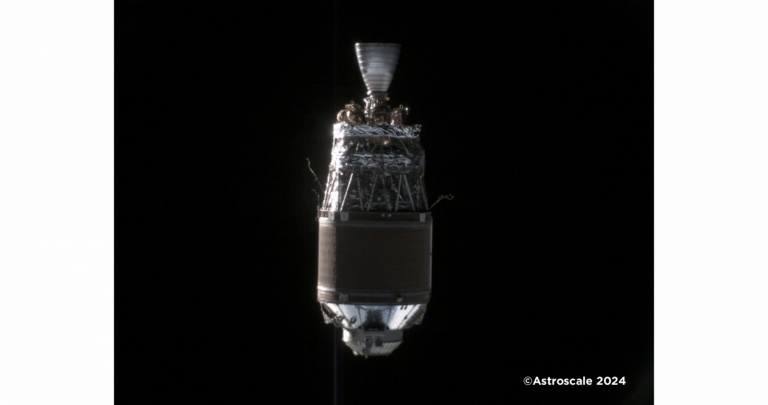New image reveals stunning details of rocket upper stage taken from fixed-point observation.
Astroscale Japan Inc. (“Astroscale Japan”), a subsidiary of Astroscale Holdings Inc. (“Astroscale”), a market leader in satellite servicing and long-term orbital sustainability across all orbits, announced that its commercial debris inspection demonstration satellite, Active Debris Removal by Astroscale-Japan (ADRAS-J), has achieved another unprecedented milestone for a commercial company. ADRAS-J successfully completed the safe and controlled approach to an unprepared space debris object – a rocket upper stage – to a relative distance of approximately 50 meters, collecting further images and data while maintaining a controlled fixed point relative position from the upper stage. This second image released from the mission, taken in May, follows the first image released on April 26, captured from several hundred meters behind the debris.

ADRAS-J is a groundbreaking mission as the world’s first attempt to safely approach, characterize and survey the state of an existing piece of large debris through Rendezvous and Proximity Operations. ADRAS-J is designed to rendezvous with an unprepared Japanese upper stage rocket body (approximately 11 meters long, 4 meters in diameter, and weighing approximately 3 tons), demonstrate proximity operations, and gather images to assess the rocket body’s movement and condition of the structure. Unprepared objects in orbit pose an additional challenge as they are not designed with any technologies that enable docking or potential servicing or removal.
The ADRAS-J mission has reached several milestones since rendezvous operations began on February 22. During this phase, the ADRAS-J spacecraft started manoeuvring towards the upper stage client’s orbit using GPS and ground-based observation data. By April 9, ADRAS-J had successfully detected the client with its onboard visual camera and started the proximity approach phase, underscored by starting Angles Only Navigation, a navigation method used to estimate relative position and velocity through the servicer’s onboard cameras. When ADRAS-J was within a few kilometres of the debris, the team successfully transitioned relative navigation control to the onboard infrared camera with Astroscale-developed Model Matching Navigation (MMN) algorithms. This navigation method estimates relative distance by comparing captured images or client data to a pre-existing model. On April 16, ADRAS-J began using MMN to process data on the client’s characteristics, such as shape and attitude and successfully approached a relative distance of several hundred meters by April 17. In May, ADRAS-J safely and successfully approached the client to approximately 50 meters and conducted fixed-point observations.
The major mission highlights include:
Feb. 18: launch and start of in-orbit operations.
Feb. 22: start of the rendezvous phase.
Apr. 9: start of Angles Only Navigation and proximity approach from several hundred kilometres.
Apr. 16: start of MMN relative navigation techniques.
Apr. 17: approach the client within several hundred meters.
May 23: approach the client within 50 meters.
In the next phase, ADRAS-J will attempt to capture additional images of the upper stage through various controlled close-approach operations. The images and data collected are expected to be crucial in better understanding the debris and providing critical information for future removal efforts.
About Commercial Removal of Debris Demonstration (CRD2)
Astroscale Japan has been selected by the Japan Aerospace Exploration Agency (JAXA) and contracted as the partner for CRD2 Phase I. This phase aims to demonstrate technologies for removing large pieces of debris, among other applications, and has led to the development of ADRAS-J.
CRD2 represents a new initiative by JAXA, with two primary goals: to develop debris removal technologies to address the growing space debris issue and to foster the commercial endeavors of Japanese companies. This project is carried out with JAXA’s support, including technical guidance, testing facilities, and the rights to research findings’ intellectual property.
For more information, please visit the CRD2 website: https://www.kenkai.jaxa.jp/crd2/project/
About Astroscale
Founded in 2013, Astroscale is developing innovative and scalable solutions across the spectrum of on-orbit servicing, including life extension, in-space space situational awareness, end-of-life, and active debris removal, to create sustainable space systems and mitigate the growing and hazardous buildup of debris in space. Astroscale is also defining the economics of on-orbit servicing and working with government and commercial stakeholders to develop norms, regulations, and incentives for the responsible use of space.
Headquartered in Japan, Astroscale has an international presence with subsidiaries in the United Kingdom, the United States, France, and Israel. Astroscale is a rapidly expanding venture company, working to advance safe and sustainable growth in space and solve a growing environmental concern.
Find out more about Astroscale at www.astroscale.com.


 Copyright 2023 All rights reserved.
Copyright 2023 All rights reserved.